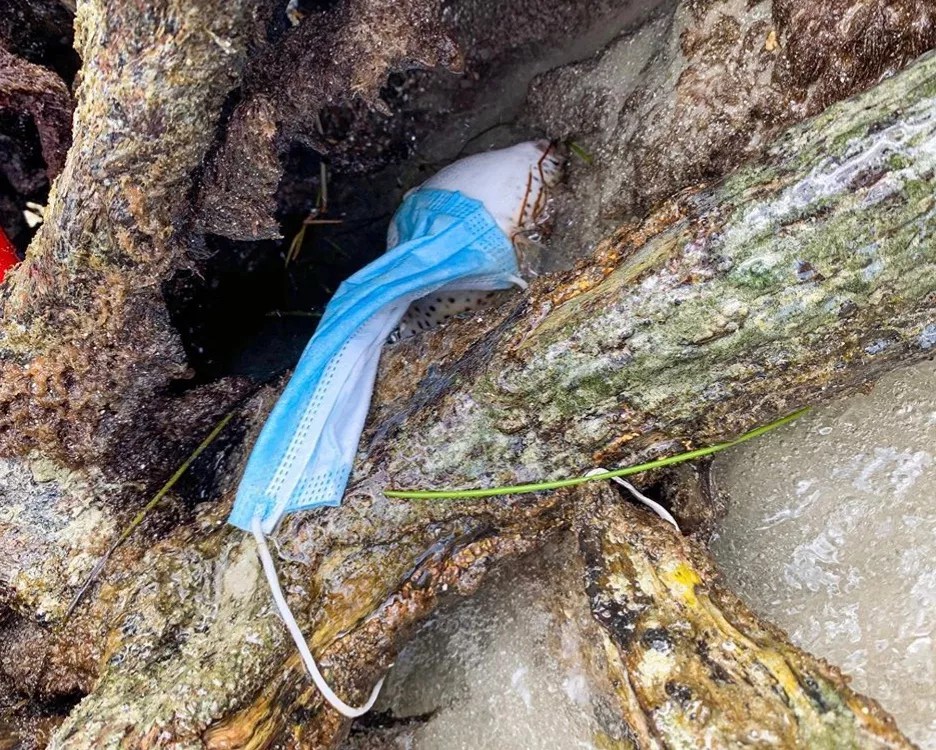
Photo courtesy of Clean This Beach Up

Audio By Carbonatix
Before Hurricane Isaías wiped away any chance of sun this past weekend, Mariajose Algarra and a small group of volunteers took their kayaks and paddleboards out to Pace Picnic Island west of Miami Beach for a beach cleanup on Friday.
The group’s haul included several large bags filled with much of the usual: plastic water bottles and caps, aluminum cans, cafecito cups, glass bottles, small propane cylinders, and the occasional pair of shoes left behind by boaters and partiers. They picked up about 360 pounds of trash.
On the north side of the island, one of the volunteers, Tiffany Menichetti, happened upon a sad sight – a dead, bloated pufferfish tangled in the ear loops of a disposable blue facemask.
“I knew what it was immediately – there are so many pufferfish around there,” Menichetti says. “We found it in the mangroves being sloshed around.”
Algarra, a founder of the environmental group Clean This Beach Up, was used to hosting regular cleanups in and around South Beach with as many as 100-plus volunteers in the Before Times. Now, they get by with smaller groups to rid waterways of trash as best they can.
For months, Algarra has used her organization’s Instagram page, @cleanthisbeachup, to raise awareness about the wipes, gloves, masks, and other types of personal protective equipment that have been littering South Florida streets, sidewalks, beaches, parking lots, storefronts, and grocery carts since the start of the pandemic.
And for months, she and others concerned about environmental conservation have seen the writing on the wall – that the new form of litter would inevitably end up in South Florida waterways and potentially threaten marine life.
“There’s so much pollution in the waterways,” Algarra says. “This may be the one fish we found, but how many other animals could be getting stuck and entangled in PPE?”
Algarra and Menichetti say they worry about sea turtle hatchlings getting stuck in trash or blocked on their way to the shore.
“Now, especially during turtle hatching season, we make sure to make a clear path between the nest and the ocean,” Menichetti says.
Algarra continues to pick up trash during walks, errands, and grocery runs. In March and April, she says, disposable gloves were the main culprit. Using the hashtag #TheGloveChallenge, she encouraged people to photograph the gloves they saw in the wild. Algarra says she’s received about 11,000 photos from all over the world.
Now, as Clean This Beach Up resumes cleanups along seawalls, the causeways into and out of Miami Beach, and some waterways, the group sees masks more than any other kind of medical waste.
“It’s definitely not as much as the single-use plastics we see, but during every cleanup, we find anywhere from five to 40 masks,” Algarra says. “They’re getting washed up, so they’re already in the waterways. We’re seeing the N95s and the regular blue ones. We find so many on the beach, stuck in seaweed. People may be leaving them when they visit the beach.”
Algarra has started another social-media campaign to keep track of masks littering communities. She invites people to take photos, tag @cleanthisbeachup in posts or Instagram stories, and use the hashtag #pickupyourmask.
Algarra and Menichetti emphasize that, just as people have a responsibility to protect themselves and others against COVID-19, they also have a responsibility to the environment.
“We want people to do better,” Algarra says.
There doesn’t appear to be any ongoing research into pandemic-related pollution and its environmental effects in Florida. A professor with the Louisiana State University Department of Oceanography & Coastal Sciences launched a research project in May to map the amount and types of PPE littering communities around the world.
Across the pond, University College London’s Plastic Waste Innovation Hub estimates that if every person in the United Kingdom, which has about one-fifth the population of the U.S., wore a new single-use mask every day for a year, it would create more than 72,000 tons of waste.